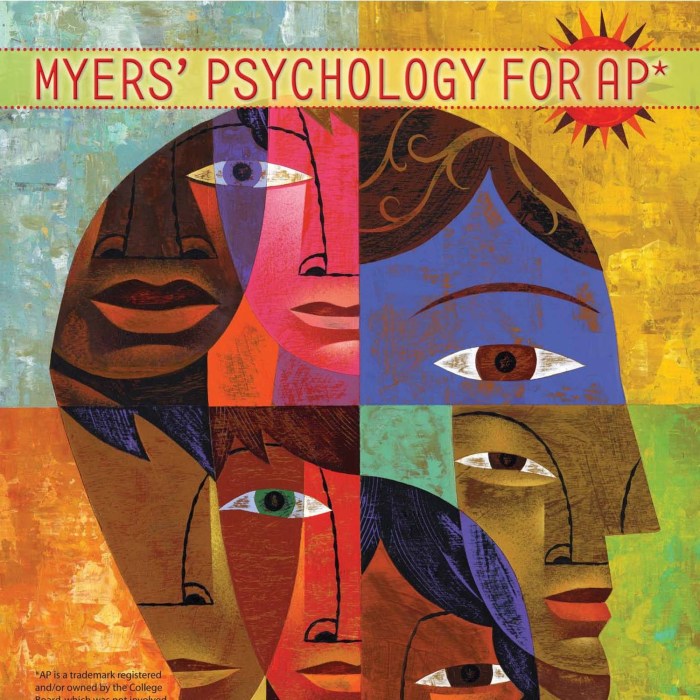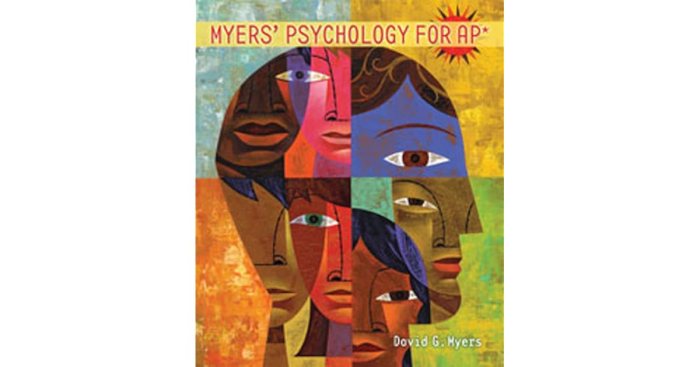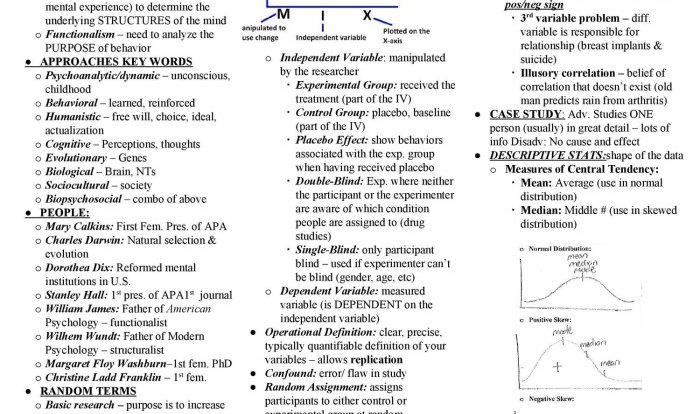Myers psychology for ap 3rd edition – Myers Psychology for AP, 3rd Edition, is a comprehensive textbook designed to provide students with a thorough understanding of the fundamental principles of psychology. Written in a clear and engaging style, this book is an essential resource for students preparing for the AP Psychology exam and for anyone interested in gaining a deeper understanding of the human mind and behavior.
The book is organized into six units, each of which covers a major area of psychology. Unit 1 provides an overview of the field of psychology, including its history, methods, and major perspectives. Unit 2 examines the biological bases of behavior, including the nervous system, hormones, and genetics.
Unit 3 explores the cognitive processes, including perception, learning, memory, and thinking. Unit 4 examines the social psychology, including interpersonal relationships, group dynamics, and social influence. Unit 5 examines the developmental psychology, including prenatal development, childhood, adolescence, and adulthood. Unit 6 examines the clinical psychology, including mental disorders, therapy, and prevention.
Myers Psychology for AP, 3rd Edition: Myers Psychology For Ap 3rd Edition

Myers Psychology for AP, 3rd Edition is a comprehensive and engaging textbook designed to meet the needs of high school students taking the Advanced Placement (AP) Psychology course. Written by renowned authors David G. Myers and C. Nathan DeWall, this textbook provides a thorough and accessible overview of the field of psychology, covering a wide range of topics from biological bases of behavior to social psychology.The
key features and benefits of Myers Psychology for AP, 3rd Edition include:
- Clear and concise writing style that makes complex psychological concepts easy to understand.
- Abundant use of real-world examples and research studies to illustrate key concepts.
- In-depth coverage of the AP Psychology curriculum, including all of the topics tested on the AP exam.
- A variety of learning aids, such as chapter summaries, key terms, and practice questions, to help students master the material.
Myers Psychology for AP, 3rd Edition is an ideal textbook for students who are serious about learning about psychology and preparing for the AP exam. Its comprehensive coverage, engaging writing style, and abundance of learning aids make it an invaluable resource for students who want to succeed in their AP Psychology course.
Target Audience and Suitability for AP Psychology Courses
Myers Psychology for AP, 3rd Edition is specifically designed for high school students who are taking the AP Psychology course. The textbook aligns with the College Board’s AP Psychology curriculum and provides a thorough and comprehensive overview of the field of psychology.
The book’s clear and concise writing style, abundance of real-world examples, and variety of learning aids make it an accessible and engaging resource for students of all levels.
Organization and Structure
Myers Psychology for AP, 3rd Edition is organized into 16 chapters, each of which covers a different topic in psychology. The chapters are grouped into four parts:
- Introduction to Psychology
- Biological Bases of Behavior
- Cognitive Processes
- Social Psychology
Each chapter begins with a chapter Artikel and a list of learning objectives. The chapter then provides a clear and concise overview of the topic, followed by a variety of learning aids, such as key terms, practice questions, and real-world examples.
The chapters conclude with a summary of the key points and a list of additional resources for further study.
Key Concepts and Theories
Myers Psychology for AP, 3rd Edition presents a comprehensive overview of the major psychological theories and perspectives that shape the field. The book provides a clear and concise explanation of each theory, highlighting its key concepts and principles.
The book uses a variety of examples and case studies to illustrate the application of these theories in real-world settings. This helps students to understand how psychological theories can be used to explain and predict human behavior.
Cognitive Psychology
- Cognitive psychology is the study of mental processes, such as perception, attention, memory, and problem-solving.
- The book covers a wide range of cognitive theories, including the information-processing model, the schema theory, and the connectionist model.
Behavioral Psychology
- Behavioral psychology is the study of how behavior is learned and reinforced.
- The book covers the major principles of behaviorism, including classical conditioning, operant conditioning, and social learning theory.
Developmental Psychology, Myers psychology for ap 3rd edition
- Developmental psychology is the study of how people change and grow throughout their lives.
- The book covers the major stages of development, from infancy to adolescence to adulthood.
Personality Psychology
- Personality psychology is the study of individual differences in behavior, thoughts, and emotions.
- The book covers a variety of personality theories, including the trait theory, the psychodynamic theory, and the humanistic theory.
Social Psychology
- Social psychology is the study of how people think, feel, and behave in social situations.
- The book covers a variety of social psychological topics, including social cognition, social influence, and group dynamics.
Research Methods and Applications
Myers Psychology for AP, 3rd Edition, provides students with a comprehensive overview of the research methods and experimental designs used in psychology. The book covers a wide range of topics, including:
- Observational methods
- Experimental methods
- Correlational methods
- Case studies
- Meta-analysis
The book also helps students understand how to apply research findings to their own lives. For example, the book provides tips on how to evaluate the validity of research studies and how to use research findings to make informed decisions about their own behavior.
Practical Applications of Psychological Research
Psychological research has a wide range of practical applications in various fields, including:
- Education:Psychological research can be used to develop more effective teaching methods and to help students learn more effectively.
- Business:Psychological research can be used to develop more effective marketing campaigns and to improve employee productivity.
- Healthcare:Psychological research can be used to develop more effective treatments for mental illness and to promote healthy behavior.
- Law:Psychological research can be used to improve the accuracy of eyewitness testimony and to develop more effective crime prevention strategies.
By providing students with a strong foundation in research methods and applications, Myers Psychology for AP, 3rd Edition, helps them become more informed consumers of psychological information and to make more informed decisions about their own lives.
Assessment and Measurement

Psychological assessment and measurement play a crucial role in understanding and evaluating psychological phenomena. This book covers various types of assessments and measurements, each with its strengths and limitations, and explores their applications in psychological research and practice.
Types of Psychological Assessments and Measurements
- Self-report measures: Participants provide information about themselves, such as their thoughts, feelings, and behaviors.
- Observational measures: Trained observers record and analyze behaviors or other observable characteristics.
- Physiological measures: Monitor physiological responses, such as heart rate, brain activity, and hormone levels.
- Neuropsychological tests: Assess cognitive abilities, such as memory, attention, and problem-solving.
- Projective tests: Use ambiguous stimuli to reveal unconscious thoughts and feelings.
Strengths and Limitations of Assessment Methods
- Self-report measures: Convenient and inexpensive, but may be subject to biases and distortion.
- Observational measures: Provide objective data, but may be time-consuming and context-dependent.
- Physiological measures: Provide real-time data, but may be affected by factors unrelated to the psychological phenomenon being measured.
- Neuropsychological tests: Standardized and reliable, but may not capture all aspects of cognitive functioning.
- Projective tests: Can provide insights into unconscious processes, but may be difficult to interpret and lack reliability.
Applications of Assessments in Psychological Research and Practice
- Diagnosis and classification: Identify individuals with specific psychological disorders.
- Treatment planning: Guide decisions about appropriate interventions.
- Research: Test hypotheses and advance understanding of psychological processes.
- Evaluation: Assess the effectiveness of interventions or programs.
- Forensic settings: Assist in legal decision-making, such as competency evaluations and risk assessments.
Cultural and Social Influences

Culture and society play a significant role in shaping our psychological development and behavior. The book incorporates cross-cultural research and perspectives to highlight the impact of cultural factors on cognition, emotion, and behavior.
Impact of Culture on Psychological Development
Culture influences our values, beliefs, and norms, which shape our perceptions, interpretations, and responses to the world. Cross-cultural studies have shown that cultural factors can affect language acquisition, cognitive development, and moral reasoning.
Social Factors and Mental Health
Social factors, such as socioeconomic status, social support, and discrimination, can significantly impact mental health and well-being. Lower socioeconomic status has been associated with higher rates of mental illness, while strong social support can buffer against stress and promote resilience.
Social Determinants of Health
The book also discusses the social determinants of health, which are the social, economic, and environmental factors that influence health outcomes. These factors include access to healthcare, education, and healthy food, as well as social support and discrimination.
Addressing Cultural and Social Influences in Therapy
Therapists need to be aware of the cultural and social influences that may affect their clients. By understanding the client’s cultural background and social context, therapists can provide more culturally sensitive and effective treatment.
Applications in Real-World Settings

Psychological principles have a wide range of applications in everyday life, from improving education and healthcare to enhancing business practices.
In the field of education, psychology helps educators understand how students learn and develop. This knowledge can be used to create more effective teaching methods and curricula, as well as to identify and support students who are struggling.
Psychology in Healthcare
In healthcare, psychology is used to help patients manage their physical and mental health conditions. Psychologists can provide therapy to help patients cope with stress, anxiety, depression, and other mental health issues. They can also work with patients to develop healthy coping mechanisms and lifestyle changes.
Psychology in Business
In business, psychology is used to understand consumer behavior and to develop marketing and advertising campaigns. Psychologists can also help businesses create more effective workplaces by improving employee morale and productivity.
Ethical Considerations
When applying psychological knowledge in real-world settings, it is important to consider the ethical implications. Psychologists must always act in the best interests of their clients and must respect their confidentiality. They must also be aware of the potential for bias and discrimination in their work.
Frequently Asked Questions
What is the target audience for Myers Psychology for AP, 3rd Edition?
The target audience for Myers Psychology for AP, 3rd Edition, is students preparing for the AP Psychology exam and anyone interested in gaining a deeper understanding of the human mind and behavior.
What are the key features of Myers Psychology for AP, 3rd Edition?
The key features of Myers Psychology for AP, 3rd Edition, include its clear and engaging writing style, comprehensive coverage of the subject matter, and abundance of learning resources, including chapter summaries, practice questions, and interactive simulations.
How is Myers Psychology for AP, 3rd Edition, organized?
Myers Psychology for AP, 3rd Edition, is organized into six units, each of which covers a major area of psychology, including the history, methods, and major perspectives of psychology; the biological bases of behavior; the cognitive processes; the social psychology; the developmental psychology; and the clinical psychology.
